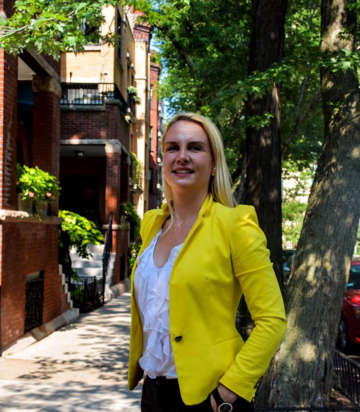Karolina Lewandowska, co-founder of She Leads Company

Karolina is currently a founder of She Leads Company, a company which supports women in their entrepreneurial journey by connecting female-led start-ups with the human and financial capital they need to succeed. She is also co-founder of StarBeam Capital which is a Venture Capital Fund investing in science-based hardware solutions in the energy, space, and general manufacturing industry.
My journey into the start-up and venture capital world was fuelled by a lifelong passion for environmental protection and renewable energy. My academic background, with master’s degrees in Physics and Energy Engineering, laid the groundwork for my 15-year career in the energy sector. I engaged in various complex projects and invested in renewable energy ventures globally, from the US to Europe. This path was both long and fascinating. Travelling between Silicon Valley and Berlin, I increasingly immersed myself in the start-up ecosystem. However, I couldn't help but notice the gender imbalance around me; female-led start-ups often faced undervaluation, receiving less support and resources compared to their male counterparts. Determined to create change, I founded 'She Leads' in 2015. This initiative is dedicated to empowering female entrepreneurs, fostering connections, and guiding investors towards deep-tech and tech-enabled start-ups, ensuring a more balanced and supportive environment for women in this field.
My engagement with the start-up and venture capital arenas deepened over time. To broaden my expertise, I pursued the Private Market Investments program at Oxford, keen on bridging the gap between entrepreneurship and investment. My goal was not just to work with start-ups but also to influence investor mindsets, ensuring that female entrepreneurs receive equitable funding. I emphasized the often-overlooked value of female investors in these discussions. In 2022, this vision culminated in the founding of StarBeam Capital, alongside three co-founders with diverse backgrounds. While our focus isn't limited to female-led start-ups, we are committed to an unbiased investment approach. At StarBeam Capital, we employ a transparent and meticulously designed assessment matrix. This tool is crucial in our process, helping us eliminate bias and ensure fair and objective evaluation of all potential business investments.

To me, entrepreneurship unfolds in two distinct phases. The initial stage, which I term the 'honeymoon' phase, is fuelled by a passion akin to a romantic endeavour. It's about nurturing the desire to carve out your own future, embracing the risks of an uncharted path over the predictability of a 9-5 job. This phase is about testing your resilience and problem-solving abilities, essential for success. The exhilaration of the honeymoon phase lies in the realization that you can indeed change the world and make a significant impact. It's a period of discovery and learning – diving into the realms of social media, sales, operations, and accounting. This phase is like stepping into an entirely new world brimming with possibilities.
However, as one delves deeper into the entrepreneurial journey, it becomes evident that passion alone is not sufficient. Running a business is akin to undergoing another master's degree; it demands a comprehensive skill set. Without these essential skills, the venture cannot rely solely on the initial passion to survive. This realization marks the transition to the second, more pragmatic phase of entrepreneurship, where passion meets the rigour of practical skills and strategic planning.
When assessing if an idea is ripe for development, there are three critical considerations. The first is market potential. It's essential to ensure that there's a sufficiently large market to allow your product to scale and grow. This involves rigorous research and gathering feedback on market demand. The second factor is timing. Analyse how your idea aligns with current market trends and technological advancements in the field. Ask yourself: Is the market ready for this product? Timing is crucial; being too early or too late can be detrimental, as seen in the delayed adoption of technologies like Electric Vehicles (EVs) or touchscreens due to consumer readiness concerns. The third and equally important aspect is financial viability. It's vital to scrutinize the business model's unit economics, examining all financial dimensions, including revenue streams and cost structures. The goal is to establish a clear pathway to profitability. If the financials don't add up, it may indicate the need for rethinking or refining the idea. This assessment helps in making an informed decision on whether to pursue the idea, adjust it, or abandon it to avoid potential failure.
I place immense value on sales skills. The ability to effectively sell your idea, and equally importantly, yourself as an entrepreneur, is fundamental.
Focus is indispensable. Success in entrepreneurship demands starting with a clear end in mind. It's common for entrepreneurs to face challenges, but maintaining a focused vision on your ultimate goals, and pushing through obstacles to achieve them, is critical for long-term success.
The ability to learn and adapt. Entrepreneurship is an ever-evolving journey, and adaptability is essential to navigate the myriad challenges and opportunities that come your way.
My approach to business success centres on appreciating the smaller, yet significant milestones rather than waiting for grand events. The most satisfying moments for me have been those early achievements that signal growth and potential. Signing up our first client or receiving an initial cheque from investors were moments worth celebrating! I believe in finding joy and a sense of accomplishment in the everyday ebb and flow of business. It’s these consistent, incremental successes that truly shape the journey and make it rewarding.
As an entrepreneur, my journey has been a learning curve, filled with valuable lessons rather than just mistakes or failures. One crucial insight I've gained is the importance of having a clear vision of the endpoint - understanding where I'm starting from (point A) and where I intend to go (point B). However, I've also realized that the path is seldom a straight line. It's often winding and fraught with unexpected challenges. Another key lesson has been the significance of persistence. The entrepreneurial journey demands a steadfast spirit, and the ability to embrace and learn from feedback, especially from those who have previously navigated similar paths. It's about recognizing that setbacks are not endpoints but opportunities to grow, learn, and improve.
Richard Branson stands out as my inspiration for his innovative approaches and entrepreneurial zeal. Starting young by interviewing entrepreneurs, he has ventured into diverse sectors like music, aviation, and telecommunication, fearlessly innovating. His leadership style, emphasizing employee empowerment and empathy, greatly appeals to me. Branson's resilience in the face of challenges and failures is admirable. As someone from the energy sector, I'm inspired by his commitment to climate change initiatives, wildlife conservation, and humanitarian efforts. His significant philanthropic activities reflect the importance of giving back, making him a truly remarkable figure.
In a brief meeting with Richard Branson, I'd be eager to explore his vision for the future. Specifically, I'd ask about his upcoming goals and the industries he's considering for his next venture or investment.
While there appears to be support for female entrepreneurs through networks and funds, a closer look reveals a persistent issue: the proportion of venture capital funding allocated to women remains disappointingly low, despite data showing that female-led businesses often outperform their male-founded counterparts in terms of operation and profitability. This disparity suggests that the efforts made so far are not effectively addressing the core problem. The issue is two-fold: firstly, the investment community, predominantly male, tends to favour familiar ideas and businesses, often overlooking the unique perspectives and solutions offered by female entrepreneurs. Secondly, the start-up ecosystem itself is largely male-dominated, both in terms of founders and the problems they aim to solve. This creates a cycle where women entrepreneurs are not only underfunded but also underrepresented and undervalued in the broader business landscape. Addressing this requires a fundamental shift in both investor mindsets and the start-up ecosystem to truly recognize and support the potential of female-led ventures.
The notion that investing in women entails more risk stems from outdated biological and non-biological perceptions. Biologically, the misconception is that women might be riskier investments due to potential maternity leaves or family obligations. However, this view is antiquated, overlooking women's proven capacity to manage business and personal commitments effectively. Moreover, it fails to equally consider family commitments as a risk factor for male entrepreneurs. Non-biologically, societal and cultural biases significantly contribute. Stereotypes about women's leadership abilities or their suitability in certain industries can create baseless doubts about their potential for success. The historically male-dominated business and investment world often leads to women's entrepreneurial efforts being undervalued or scrutinized more rigorously. These outdated perceptions overlook evidence that women-led businesses can be as or more successful than male-led ones. Furthermore, women entrepreneurs often face additional psychological challenges. In many families, deviating from the traditional road of education and employment to pursue entrepreneurship, especially with potentially lower initial earnings, can be seen as a risky path, adding additional societal pressure and creating psychological hardship, thus complicating the entrepreneurial journey for women. Overcoming these biases and recognizing the true potential of women entrepreneurs, along with the diverse perspectives they offer, remains a crucial challenge for the business landscape.
To address the biases against female entrepreneurs, we should amplify the successes of women in business, demonstrating their investment-worthiness. It's crucial to bring the inherent biases to light, affirming that business acumen transcends gender. Women do not require special assistance; rather, it's about dismantling the barriers that impede their progress, particularly the pervasive bias doubting women's capability compared to men. Eliminating these biases is essential for creating a more equitable business environment. Encouraging more women to assume leadership, and mentorship roles, and actively advocate for each other can significantly change perceptions and realities, representing a united front in the business world.
My only advice would be to be courageous and (try to) have fun!



